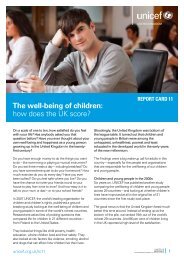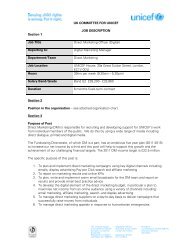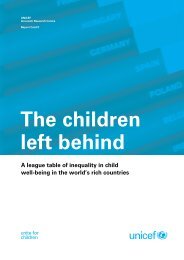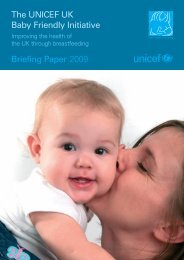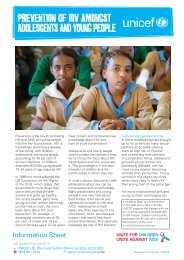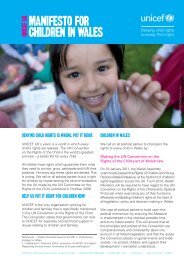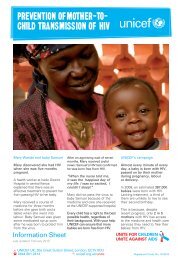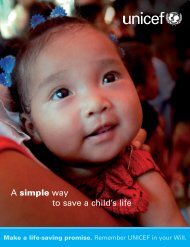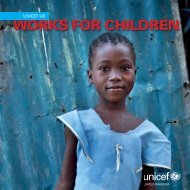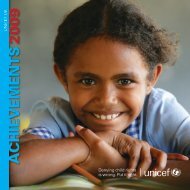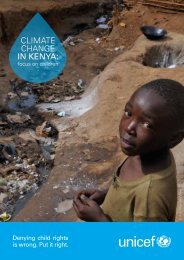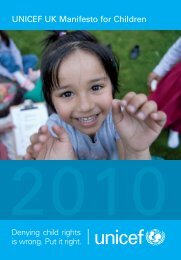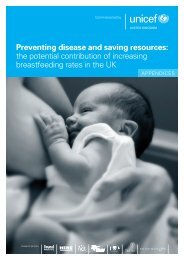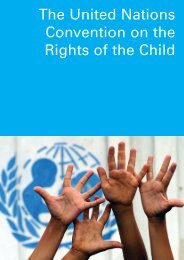UNICEF UK Trustees Report and Financial Statements 2010
UNICEF UK Trustees Report and Financial Statements 2010
UNICEF UK Trustees Report and Financial Statements 2010
You also want an ePaper? Increase the reach of your titles
YUMPU automatically turns print PDFs into web optimized ePapers that Google loves.
The United Kingdom Committee for <strong>UNICEF</strong><br />
<strong>Report</strong> of the <strong>Trustees</strong><br />
For the year ended 31 December <strong>2010</strong><br />
c. HIV <strong>and</strong> children<br />
Every child has the right to be as healthy as possible. Yet in 2009, around 370,000<br />
babies were born with HIV, 260,000 children died of AIDS, 2.5 million children were<br />
living with HIV, <strong>and</strong> 16.6 million children had lost one or both parents to AIDS. 5<br />
<strong>UNICEF</strong>’s global campaign Unite for Children, Unite against AIDS has four key aims:<br />
to prevent mother-to-child transmission of HIV; to provide children with life-saving<br />
anti-retroviral medicine; to prevent new infections among young people; <strong>and</strong> to<br />
protect, care for <strong>and</strong> support orphans <strong>and</strong> other children made vulnerable by HIV <strong>and</strong><br />
AIDS. These key aims support Millennium Development Goal 6: to halt <strong>and</strong> begin to<br />
reverse the spread of HIV by 2015.<br />
<strong>UNICEF</strong>’s global Unite for Children, Unite against AIDS campaign is a key priority,<br />
supported by many events, corporate partners, high-profile supporters, trusts <strong>and</strong><br />
grant-making bodies, <strong>and</strong> members of the public. Since the campaign launch in<br />
2005, <strong>UNICEF</strong> <strong>UK</strong> has generated £17.5 million (including £2.1 million in <strong>2010</strong>).<br />
The campaign has four priorities:<br />
• Prevent mother-to-child transmission of HIV (PMTCT)<br />
• Provide anti-retroviral medicine for children with HIV<br />
• Prevent infection in young people<br />
• Protect, care for <strong>and</strong> support orphans <strong>and</strong> other children made vulnerable by<br />
HIV <strong>and</strong> AIDS<br />
World AIDS Day<br />
On World AIDS Day (1 December <strong>2010</strong>), <strong>UNICEF</strong> <strong>UK</strong> in partnership with the Stop<br />
AIDS Campaign launched the Stop babies being born with HIV campaign. This asked<br />
the <strong>UK</strong> Government to commit its fair share of funding to the Global Fund to Fight<br />
AIDS, TB <strong>and</strong> Malaria (£840 million over the next three years drawn from the existing<br />
aid budget) to keep alive the promise of stopping babies being born with HIV by<br />
2015 <strong>and</strong> put the global effort to tackle HIV back on track. More than 2,000 <strong>UNICEF</strong><br />
<strong>UK</strong> supporters took this action sending a strong signal to the Government during its<br />
review of all <strong>UK</strong> aid activities.<br />
Just walk<br />
<strong>UNICEF</strong> <strong>UK</strong> supporters took part in Just Walk, a sponsored walk across the South<br />
Downs that raised £20,000 for <strong>UNICEF</strong>’s work with orphans <strong>and</strong> other children left<br />
vulnerable by HIV <strong>and</strong> AIDS. This work includes initiatives such as the Isibindi<br />
programme in South Africa, which helped thous<strong>and</strong>s of orphans <strong>and</strong> orphan-headed<br />
households to link up with social services in <strong>2010</strong>. These links meant that children<br />
were able to get cash transfers to help them run the household, buy school uniforms<br />
5 Joint United Nations Programme on HIV/AIDS, 2008 <strong>Report</strong> on the global AIDS epidemic,<br />
UNAIDS, Geneva, August 2008, p. 218.<br />
11



